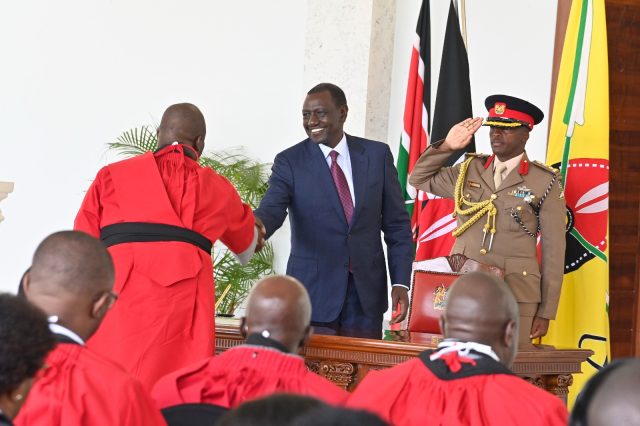NAIROBI, May 14 (NNN-KBC) — Kenyan President William Ruto has urged the 20 newly appointed Judges of the High Court to serve with integrity and professionalism.
Speaking during the swearing-in ceremony at State House on Tuesday, the President called on the judges to uphold credibility of the Judiciary when carrying out their duties
“I encourage you to commit yourselves to serving the people with integrity and professionalism and to reject corruption in all its manifestations. Without integrity, the credibility of our judiciary, as well as all public institutions, is severely questioned,” said Ruto.
The head of state acknowledged the critical role governance institutions play in enhancing democracy and the need for a strong and effective judiciary.
“An independent judiciary, an effective executive, a progressive legislature, an open civil society, and a vigilant media are not mutually exclusive; instead, they share a mandate to serve the people and should facilitate each other’s efforts,” Ruto stated.
“Your commitment to diligently serve the people of Kenya, and do justice to them – without fear, favour, bias, affection, ill-will, prejudice or any political, religious or other influence – will make the difference between progress and failure, freedom and tyranny, and prosperity and destitution for the people of our beloved nation,” he added
The 20 Judges, among them eight women, were appointed last week by President William Ruto following a recommendation by the Judicial Service Commission.
The new judges are Moses Ado Otieno, Alice Chepngetich Bett Soi, Benjamin Mwikya Musyoki, John Lolwatan Tamar, Francis Weche Andayi, Andrew Bahati Mwamuye, Julius Kipkosgei Ng’ arng’ ar, Wendy Kagendo Micheni, Emily Onyando Ominde and Helene Rafaela Namisi.
Others are Alexander Muasya Muteti, Julius Mukut Nangea, Benjamin Kimani Njoroge, Caroline Jepyegen Kendagor, Stephen Nzisi Mbungi, Linus Poghon Kassan, Noel Onditi Adagi Inziani, Tabitha Ouya Wanyama, Rhoda Cherotich Rutto and Joe Omido Mkutu.
Pres Ruto said the Executive will continue to support the Judiciary to serve Kenyans better, adding that an effective and efficient judiciary is good for the country.
This, he said, is because the country’s economy and security, and the people’s rights and freedoms depend on the judiciary.
“We shall make our contribution to enhance the capacity of the Judiciary to deliver justice in every part of Kenya, especially through infrastructure development projects,” said President Ruto.
To support these efforts, the President noted that funding for the justice and law and order sector to combat corruption and promote accountability has increased from KSh87 billion to KSh108 billion since the 2022/23 financial year.
“Some of these resources have contributed to the judiciary’s infrastructure development, including construction of courts, staff recruitment and capacity building for law enforcement agencies,” he said.
He added: “I am happy that the establishment of small claims courts across the country has brought justice closer to the people and resulted in a significant increase in the number of resolved cases.”
President Ruto expressed confidence that the three arms of government – Executive, Legislature and Judiciary – will continue engaging in a progressive manner and finding consensus in ways that serve the citizens better.
The President said the Bottom Up Economic Transformation Agenda acknowledges the critical role played by institutions of governance, especially a strong and effective Judiciary in Kenya’s progress and inclusive prosperity.
“An independent Judiciary, an effective Executive, a progressive Legislature, an open civil society and a vigilant media are not mutually exclusive; instead, they share the mandate to serve the people and should complement one another’s efforts,” the President said.
He pointed out that this collaboration must extend to accountability and transparency, saying this is why the Public Benefits Organisations Act of 2013 was operationalised last week.
“By unifying regulations and promoting participatory governance, we aim to increase accountability and transparency across all arms of government,” he said.
“Ultimately, we will be judged not by how we serve the strong and influential, but by how we support the weak, the poor, and the vulnerable,” he added. — NNN-KBC







